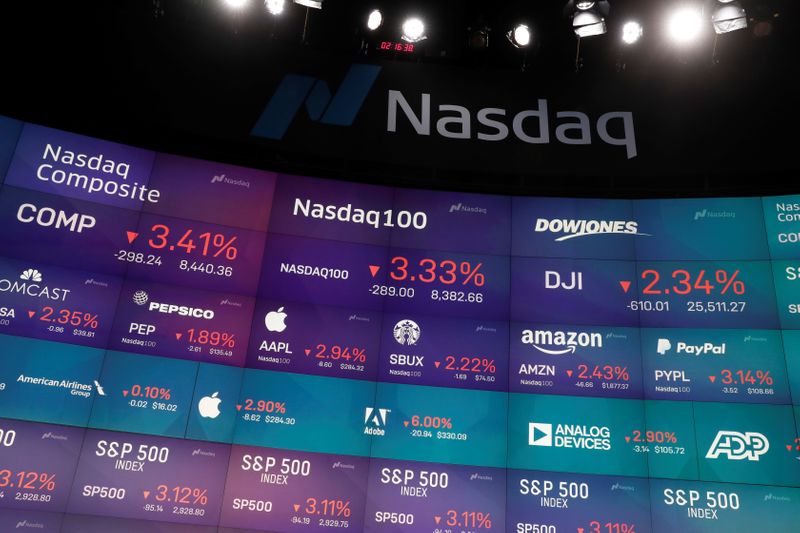By April Joyner
NEW YORK (Reuters) - U.S. stocks fell on Friday as fears of economic damage from the spread of the coronavirus intensified, though Wall Street's major indexes ended well above their session lows.
The S&P 500 posted its 10th decline in 12 sessions as moves to contain the virus crippled supply chains and prompted a sharp cut to global economic growth forecasts for 2020. Since its record closing high on Feb. 19, the benchmark index has lost more than 12%, wiping out $3.43 trillion from its market capitalization, according to S&P Dow Jones Indices.
Even so, for the week the S&P 500, along with the Dow Jones Industrial Average and the Nasdaq, posted a modest gain as stocks on Friday pared losses late in the session. Comments from Federal Reserve officials about the possibility of using other tools in addition to interest rate cuts to blunt the economic impact of the coronavirus helped stocks ease declines, said Alicia Levine, chief strategist at BNY Mellon Investment Management in New York.
Nonetheless, "it's very unclear what the economic impact will be," Levine said.
Yields on long-dated U.S. Treasuries fell to record lows as investors fled to bonds, whose prices move inversely to their yields. The drop in Treasury yields weighed heavily on shares of financial companies, which tumbled 3.3%. The S&P 500 banks index dropped 4.7%, bringing its total decline for the week to more than 8%.
Shares of cruise operators Carnival (NYSE:CCL) Corp and Royal Caribbean Cruises Ltd slid after Reuters reported that the administration of President Donald Trump was considering ways to discourage U.S. travelers from taking cruises. Carnival shares fell 2.6%, and Royal Caribbean shares dropped 1.2%.
"The decline today is all about the efforts to contain the spread of the virus," said Emily Roland, co-chief investment strategist at John Hancock Investment Management in Boston. "The measures being taken could dampen commerce and consumer activity, and markets are responding to that."
Data showing a robust pace of hiring in February largely went ignored, given that the data captured little of the impact from the coronavirus. A sharp downturn in later economic and corporate earnings data would likely strike a further blow to U.S. markets, analysts said.
The Dow Jones Industrial Average fell 256.5 points, or 0.98%, to 25,864.78, the S&P 500 lost 51.57 points, or 1.71%, to 2,972.37, and the Nasdaq Composite dropped 162.98 points, or 1.87%, to 8,575.62.
For the week, the S&P 500 gained 0.6%, the Dow added 1.8% and the Nasdaq rose 0.1%.
All 11 S&P sectors ended lower on the day Friday, led by a 5.6% drop in energy stocks, which tracked a 10% slump in U.S. crude prices. [nL4N2AZ0SL]
The Cboe Volatility Index, known as "Wall Street's fear gauge," hit its highest level since August 2015 during the session but pulled back as stocks pared losses. It ended 2.32 points higher at 41.94.
Starbucks Corp (NASDAQ:SBUX) shares declined 1.1% after the coffee chain said it expected its sales in China in the quarter ending in March to fall by 50% in stores open for at least a year.
Costco Wholesale Corp (NASDAQ:COST) shares fell 1.4% as it said it was struggling to keep up with demand for essentials, including disinfectants.
Declining issues outnumbered advancing ones on the NYSE by a 4.40-to-1 ratio; on Nasdaq, a 3.77-to-1 ratio favored decliners.
The S&P 500 posted five new 52-week highs and 142 new lows; the Nasdaq Composite recorded 16 new highs and 542 new lows.

Volume on U.S. exchanges was 14.20 billion shares, compared to the 10.54 billion average for the full session over the last 20 trading days.